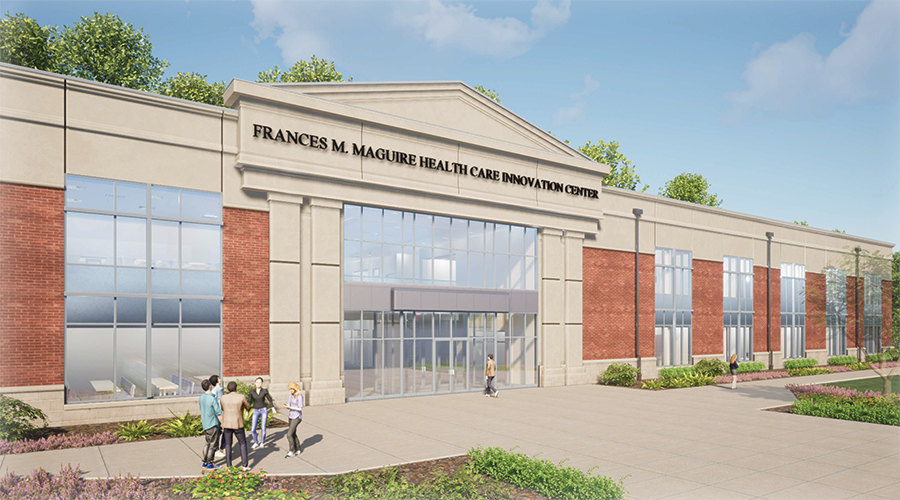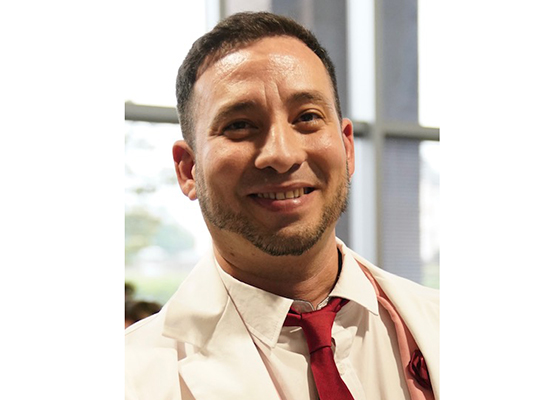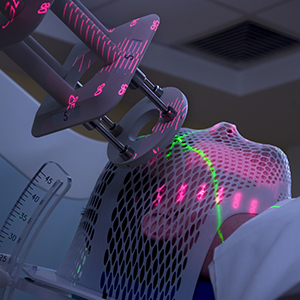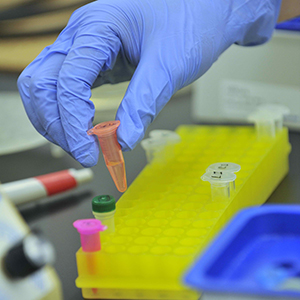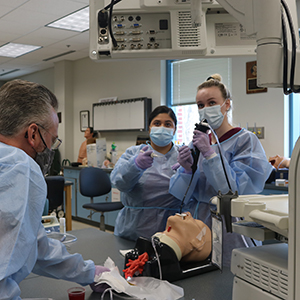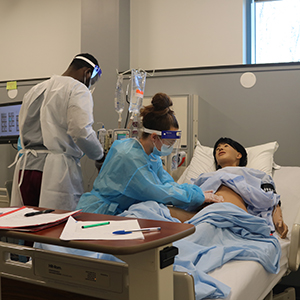Radiologic Technology Program
This program currently has a waitlist for Fall 2025 admissions. Please contact admissions@gmercyu.edu with any questions.
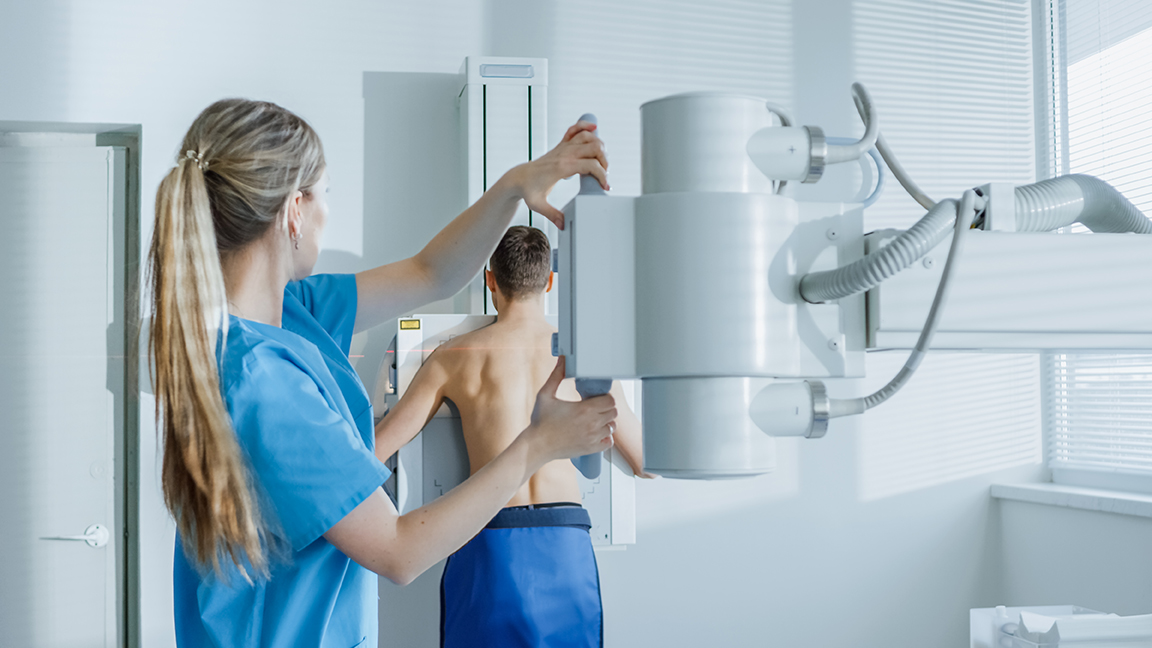 Radiologic technologists, also called x-ray technologists (and sometimes incorrectly referred to as “radiologic technicians”), help physicians diagnose patient diseases and conditions by performing x-rays, computed tomography (CT), MRI, mammography and other diagnostic medical imaging procedures.
Radiologic technologists, also called x-ray technologists (and sometimes incorrectly referred to as “radiologic technicians”), help physicians diagnose patient diseases and conditions by performing x-rays, computed tomography (CT), MRI, mammography and other diagnostic medical imaging procedures.
Upon successful completion of your GMercyU and affiliate radiography program requirements, you’ll be eligible to sit for the National American Registry of Radiologic Technologists (ARRT) Examination in Radiography. In 2023, graduates of our radiology program passed this exam with a 100% success rate. With this certification and your bachelor’s degree, you’ll be eligible for many employment opportunities in the field.
-
100%
of GMercyU RT grads passed the National American Registry of Radiologic Technologists (ARRT) Examination in Radiography in 2023
-
100%
of recent GMercyU RT grads secured jobs BEFORE graduation
-
$77,027
average salary for radiologic technologists in 2022 (American Society of Radiologic Technologists)
-
6%
projected job growth for radiologic technologists nationwide through 2033, faster than the national average (Bureau of Labor Statistics)
-
100%
of full-time undergraduate GMercyU students receive some form of financial aid
Program Details
BS in Radiologic Technology Program
GMercyU’s 2+2 Radiologic Technology program is the standard degree path followed by most GMercyU Radiologic Technology majors. During the first two years, you’ll complete general education requirements for a strong liberal arts foundation. At the beginning of year two, you’ll work with your Campus Coordinator and apply to at least three of GMercyU’s affiliated radiologic technologist programs. The student must apply and be accepted to the affiliate program in order to attend.
Your third and fourth years will be spent on-site at the affiliate radiologic technology program and their clinical education sites, taking classroom and clinical courses full-time. You’ll also work with your Campus Coordinator to register for all corresponding GMercyU courses to continue to build your transcript toward graduation. This full-time, 40 hours/week daytime program includes at least one summer, possibly two, so while you may walk in graduation in May of your senior year, you will most likely complete your graduation requirements in time for the August graduation date. (Please note that there is no commencement ceremony in August or December.)
To suit your specific needs, GMercyU also offers the following two specialized degree options.
Read our Radiologic Technology Overview (PDF).
Radiologic Technology Completion Program (Reverse Bachelor’s)
If you’re already ARRT-certified after attending a radiology school and passing the ARRT Examination in Radiography, you can earn up to 62 units of credit for your radiologic technology education. You will just complete the remaining general education and liberal arts course requirements to earn your BS in radiologic technology from GMercyU.
If you have completed college coursework at other colleges or radiology schools, you may be eligible to transfer in additional credits, but you must complete a minimum of 45 credits at GMercyU. This degree may be completed full-time or part-time, with some courses available in the evening or online.
BS Radiologic Sciences from Thomas Jefferson University
If you’re interested in multi-competency training, you can pursue two areas of competency by completing prerequisite courses in order to apply for Thomas Jefferson University’s radiology programs. Options include radiography, computed tomography (CT), MRI, general sonography (ultrasound) and vascular sonography.
This is a very selective program and requires additional prerequisites, so advance planning is required if you want to apply. If accepted to Jefferson, you’ll transfer for your last two years (or slightly longer) and earn a Bachelor’s of Science in Radiologic Sciences from Thomas Jefferson University.
Earning a four-year radiology degree at GMercyU can enhance your value to employers and may offer better job opportunities and security. You’ll gain real-life experience through program completion at one of GMercyU’s Radiologic Technology affiliate programs:
- Einstein Medical Center’s School of Radiologic Technology
- York/WellSpan Medical Center’s School of Radiologic Technology
- Widener Allied Health School of Radiologic Technology
- Capital Health School of Radiologic Technology (Trenton, NJ)
- Shore Medical Center’s School of Radiologic Technology (Somers Point, NJ)
- The Philadelphia School of Radiologic Technology at St. Christopher’s Hospital for Children
Students must apply and be accepted to an affiliate program to attend.

All of our Radiologic Technology Affiliate Programs are accredited by the Joint Review Committee on Education in Radiologic Technology (JRCERT).
As a GMercyU Radiologic Technology major, you’ll also:
- Access the clinical training and education of a radiologic technology program (once accepted) while still earning credit towards a bachelor’s degree and maintaining eligibility for federal financial aid through GMercyU. Please note: all GMercyU scholarships, grants, and merit awards do not continue while at the affiliate program due to the lower tuition. Students can still continue to file the FAFSA for federal aid. (Please see VA Tuition)
- Learn from experienced, full-time faculty members (no teaching assistants!). GMercyU’s low 10:1 student to faculty ratio means personalized attention, support, and mentorship from faculty. Our affiliate radiology tech schools offer the same experience, including small classes and teachers who are experts in the field.
- Get an edge over your competition in the workforce by obtaining a degree above the entry-level, associate's degree required.
- Obtain extra support and advisement from the Campus Coordinator.
Graduates of radiologic technologic schools have a solid educational foundation in radiography, but with additional training and certification, you could work in advanced imaging modalities including computed tomography (CT), mammography, interventional imaging, magnetic resonance imaging (MRI), interventional radiology and bone densitometry (DEXA).
The mission of the Radiologic Technology Program is an expression of the mission of Gwynedd-Mercy University and the Frances M. Maguire College of Nursing and Health Professions. The academic program provides the pre-professional courses in science, liberal arts, and humanities which allow a student to complete the junior and senior year of professional education at an approved School of Radiologic Technology and at career entry, to be proficient in performing a full range of imaging procedures and pass a national registry examination. The Radiologic Technology program combines education for professional competency with the Mercy tradition of service to society.
The mission of the Radiologic Technology program reflects the mission of the University in assuring that the student has a strong background in the sciences, liberal arts, and humanities, that the student is clinically competent and possesses the qualities and abilities expected of a Gwynedd Mercy University graduate.
Radiologic technology is an ever-changing field. Keeping pace with technology is exciting yet challenging, and so to earn a radiology degree, you should have an academic background in, and aptitude for, math and science.
Here are the courses you will complete in addition to general education requirements.
Radiological Technology - 62 Credits
| HS 109 | Medical Terminology & Acute Care Record |
| RDS 300 | Orientation/intro to Rad Tech (2 credits) |
| RDS 301 | Patient Care |
| RDS 302 | Radiographic Procedures I |
| RDS 303 | Radiographic Exposure I |
| RDS 311 | Clinical Education I |
| RDS 305 | Radiographic Procedures II |
| RDS 306 | Digital Image Acq. & Display |
| RDS 307 | Radiation Physics |
| RDS 309 | Clinical Education II |
| RDS 310 | Clinical Education III |
| RDS 321 | Ethics/Medical Law/Human Diversity |
| RDS 402 | Radiographic Procedures III |
| RDS 403 | Radiation Biology & Protection |
| RDS 404 | Advanced Imaging Techniques I |
| RDS 407 | Clinical Education IV |
| RDS 408 | Radiographic Pathology |
| RDS 409 | Advanced Imaging Techniques II |
| RDS 410 | Radiographic Procedures IV |
| RDS 413 | Clinical Education V |
| RDS 415 | Clinical Education VI |
| RDS 420 | Pharmacology & Drug Administration |
| RDS 4000 | Capstone Course |
Jefferson Prerequisites:
| CHM 151/151L/151R | Principles of Chemistry I (4 credits) |
| MTH 245 | Calculus I (4 credits) |
| PHY 241/241L/241R | General Physics I (4 credits) |
| PHY 242/242L/242R | General Physics II (4 credits) |
Credit Requirement
A minimum of 122 credits is required for the bachelor’s degree in radiologic technology. Transfer students are required to complete a minimum of 36 credits at Gwynedd Mercy University Main Campus before attending an affiliate program.
Transfer students are required to complete a minimum of 36 credits at Gwynedd Mercy University Main Campus before attending an affiliate program.
See the undergraduate catalog for further information.
See the Radiologic Technology Handbook 2024-2025 (PDF) for all details about the program.
Undergraduate Minors
Increase the value of your radiology degree by adding an undergraduate minor that best meets your personal and professional goals.
Wondering what your classes will look like as a Radiologic Technology major at GMercyU? Here’s a closer look at just a few of the courses in the program. You’ll find that part of the GMercyU experience is an emphasis on the principles of compassionate and empathic patient care.
HS109 Medical Terminology & Acute Care Record
This course allows students to learn the language of medicine with an emphasis on the application of medical terminology in medical records. The types of terms that will be taught include: the components of medical words, terms specific to all body systems, common disease processes and common drug names and their prescribed uses. The content of the acute care record and the documentation needs of the related healthcare practitioners will be an integral topic of this class.
RDS 301 Patient Care
This course is designed to provide the basic concepts of patient care, including consideration for the physical and psychological needs of the patient and family. Routine and emergency patient care procedures are described, as are infection control procedures using standard precautions. The role of the radiographer in patient education is identified.
RDS 403 Radiation Biology & Protection
This course’s major topics are the principles of radiation biology, including the interaction of radiation with living tissue and the methods used to protect the patient, radiographer and others. Radiation effects on molecules, cells, tissues and the body as a whole are presented. Factors affecting biological response are discussed, including acute and chronic effects of radiation. An overview of protection is presented. Radiation health and safety requirements of federal and state regulatory agencies, accreditation agencies and healthcare organizations are incorporated.
For all Radiologic Technology course descriptions, please refer to the undergraduate catalog.

Joy Fox, BS, RT (R) (M) (QM) (CT)
Position: Campus Coordinator, Medical Laboratory Science & Radiologic Technology
Did You Know? Fox has spent many years working in the Medical Imaging field as a staff radiologic technologist, quality assurance technologist, and chief and administrative technologist as well as an educator in various institutions in the tristate region.
Read bio
Interested in treating cancer as part of an oncology team?
Explore our Radiation Therapy major.
Real-World Opportunities
Our graduates have gone on to work in hospitals, outpatient centers, urgent care centers, and physician offices. Other career paths include education and/or administration, sales, and research.
Top Jobs for Radiologic Technologists
Radiologic Technologist (Radiographer, x-ray technologist)
Description: These healthcare professionals perform x-rays and other diagnostic medical imaging procedures to help physicians diagnose patient diseases and conditions.
Degree Requirements: A.S. degree required; B.S. in Radiologic Technology preferred. You must also obtain certification from the American Registry of Radiologic Technologists (ARRT).
Average Salary: In 2022, the mean annual full-time compensation was $77,027.
*Source
Cat Scan (CT) Technologist
Description: These technologists operate CT (computed tomography) equipment to run CAT scans of a patient’s bones and tissues to help diagnose medical conditions.
Degree Requirements: A.S. degree required; B.S. in Radiologic Technology preferred. You must also obtain certification from the American Registry of Radiologic Technologists (ARRT).
Average Salary: In 2022, the mean annual full-time compensation was $78,159.
*Source
Magnetic Resonance Imaging (MRI) Technologist
Description: These types of technologists conduct MRIs (magnetic resonance imaging scanners) to create images of a patient’s tissues and organs to help diagnose a range of possible medical issues. These experts will need to know how to best position a patient to get high-quality images.
Degree Requirements: A.S. degree required; B.S. in Radiologic Technology preferred. You must also obtain certification from the American Registry of Radiologic Technologists (ARRT).
Average Salary: In 2022, the mean annual full-time compensation was $82,395.
*Source
Have questions about GMercyU's admissions requirements or transferring eligible credits? Contact us! Our Admissions staff is ready to walk you through the process of applying to GMercyU’s Radiologic Technology program.
Transfer students are required to complete a minimum of 36 credits at Gwynedd Mercy University Main Campus before attending an affiliate program.
Email: admissions@gmercyu.edu
Phone: 215-641-5510
Please note: Students enrolling in this program must have the ability to obtain a U.S. background check and other clearances for placement in a U.S. clinical/school setting. U.S. citizenship or permanent residency is also a requirement for licensure within certain academic programs. International students and students who are under DACA status or are undocumented should carefully review the licensure requirements in their state before enrolling in a degree program that leads to licensure. Additional information can be found on the National Conference of State Legislatures website.
Licensure: This program was designed to meet the licensure requirements of the Commonwealth of Pennsylvania. If you reside in a different state, you should carefully review your home state’s licensure requirements prior to enrolling in this program. For more information, please visit our Program Licensure Requirement page.
At GMercyU, we strive to make a quality education accessible to all through financial aid, scholarships, and grants. As a military-friendly university, we welcome service members and participate in all VA educational benefits programs. Please note: all GMercyU scholarships, grants, and merit awards do not continue when students are at the affiliate program due to the lower tuition. Students can still continue to file the FAFSA for federal aid.
While at an affiliate radiography program: Students who receive tuition assistance from the Veterans Administration (VA) should be aware that once they enter the affiliate program, the University will no longer be the liaison for processing VA tuition transactions. It is the student’s responsibility to contact the affiliate program to find out if they are a VA participating program prior to applying. The certifying official at a VA participating affiliate will assume the role of processing VA benefits while enrolled in the affiliate program. The student should also contact the VA directly for additional information.
Get the training you need for a healthcare career in radiologic technology.
